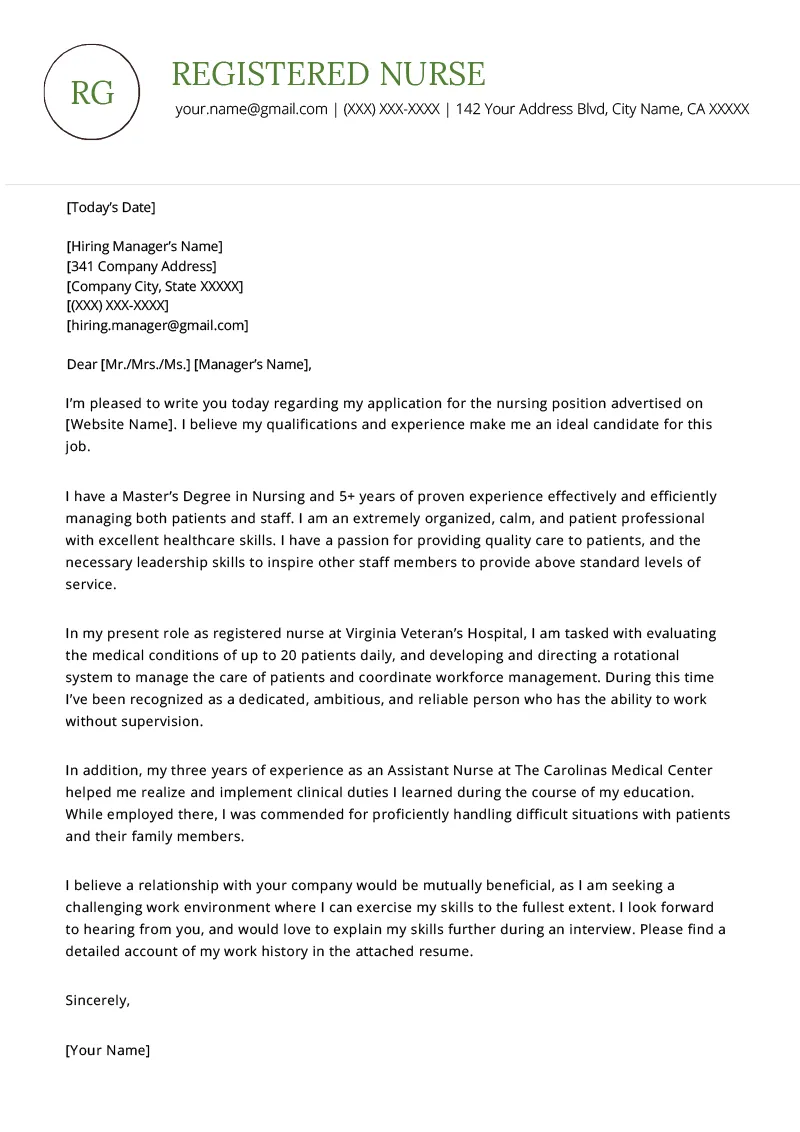What is a Nursing Cover Letter?
A nursing cover letter is a crucial document that accompanies your resume when applying for a nursing job. It serves as an introduction, a personalized summary of your skills and experiences, and an opportunity to express your interest in a specific role or organization. Unlike a resume, which provides a factual overview of your background, a cover letter allows you to showcase your personality, passion for nursing, and how your qualifications align with the requirements of the position. It’s your chance to make a strong first impression and persuade the hiring manager to review your resume in detail. A well-crafted cover letter can significantly increase your chances of landing an interview by highlighting your unique value proposition and demonstrating your genuine enthusiasm for the opportunity.
Why are Cover Letters Important?
Cover letters are important because they provide context to your resume. They allow you to explain gaps in your employment history, elaborate on specific experiences, and demonstrate your understanding of the role and the organization. They enable you to connect with the hiring manager on a personal level by showcasing your personality and enthusiasm. Employers use cover letters to assess your communication skills, attention to detail, and writing proficiency, all of which are essential in a nursing career. A strong cover letter can set you apart from other applicants by highlighting your accomplishments, illustrating your skills, and articulating your career goals. In a competitive job market, a well-written cover letter can be the deciding factor in securing an interview.
Key Elements to Include in Your Nursing Cover Letter
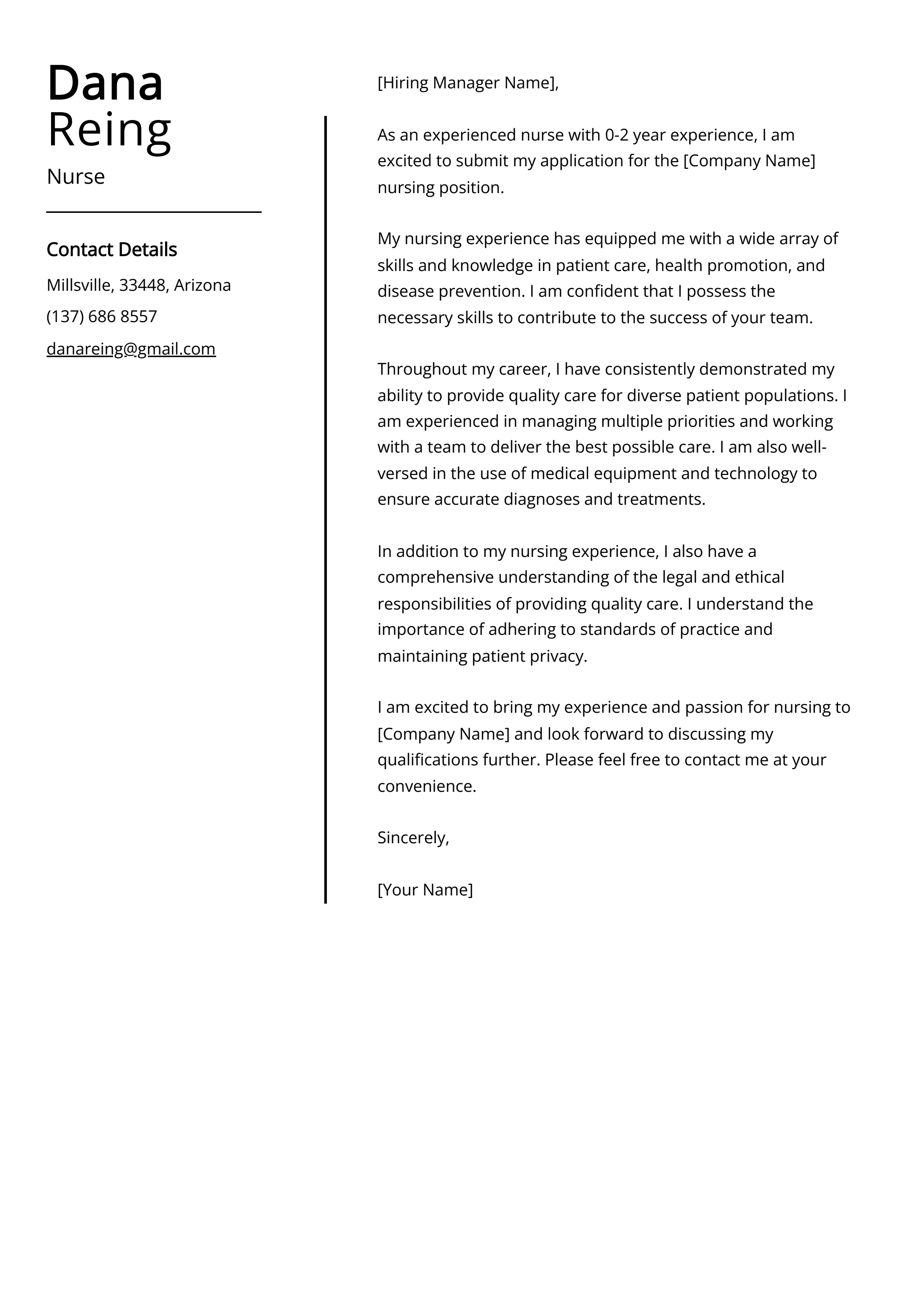
Crafting a compelling nursing cover letter involves several key elements that collectively demonstrate your suitability for the role. These elements work together to paint a picture of you as a qualified and enthusiastic candidate. Each section of the cover letter plays a critical role in conveying your skills, experiences, and aspirations. Properly including each of these elements significantly increases your chances of getting a positive response from the employer.
Your Contact Information
Start with your contact information at the top of the letter. Include your full name, address, phone number, and professional email address. Ensure your email address is professional and easy to read. This section makes it easy for the hiring manager to contact you.
Date and Recipient Information
Below your contact information, include the date and the recipient’s information. If possible, address the letter to the hiring manager or the specific person responsible for recruitment. Use their name if you know it; otherwise, use a title like ‘Hiring Manager’. Include the company name and address.
A Compelling Opening
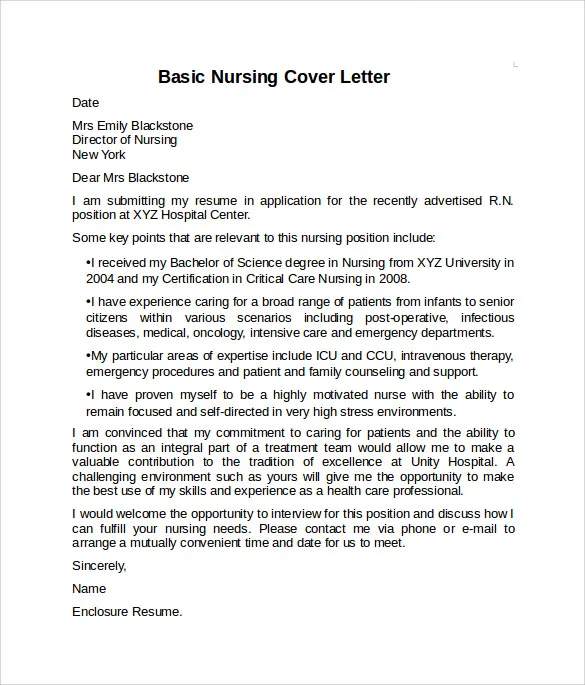
Your opening paragraph is your first chance to grab the reader’s attention. State the position you’re applying for and how you found the job posting. Briefly mention your most relevant qualifications and express your enthusiasm for the role and the organization. This sets the tone and immediately captures the reader’s interest in what is to follow in the letter.
Highlighting Your Skills and Experience
The body of your cover letter should highlight your skills and experience relevant to the job requirements. Use specific examples to demonstrate how your skills align with the needs of the position. Instead of just listing skills, explain how you’ve used them to achieve positive outcomes in previous roles. Use keywords from the job description to show that you’re a good fit.
Focus on Relevant Experiences
Choose the experiences that directly relate to the job you’re applying for. Briefly describe your role, responsibilities, and any significant achievements. Use action verbs to describe your contributions and focus on what you accomplished rather than just listing your tasks. This helps the hiring manager understand your capabilities quickly.
Quantify Your Achievements
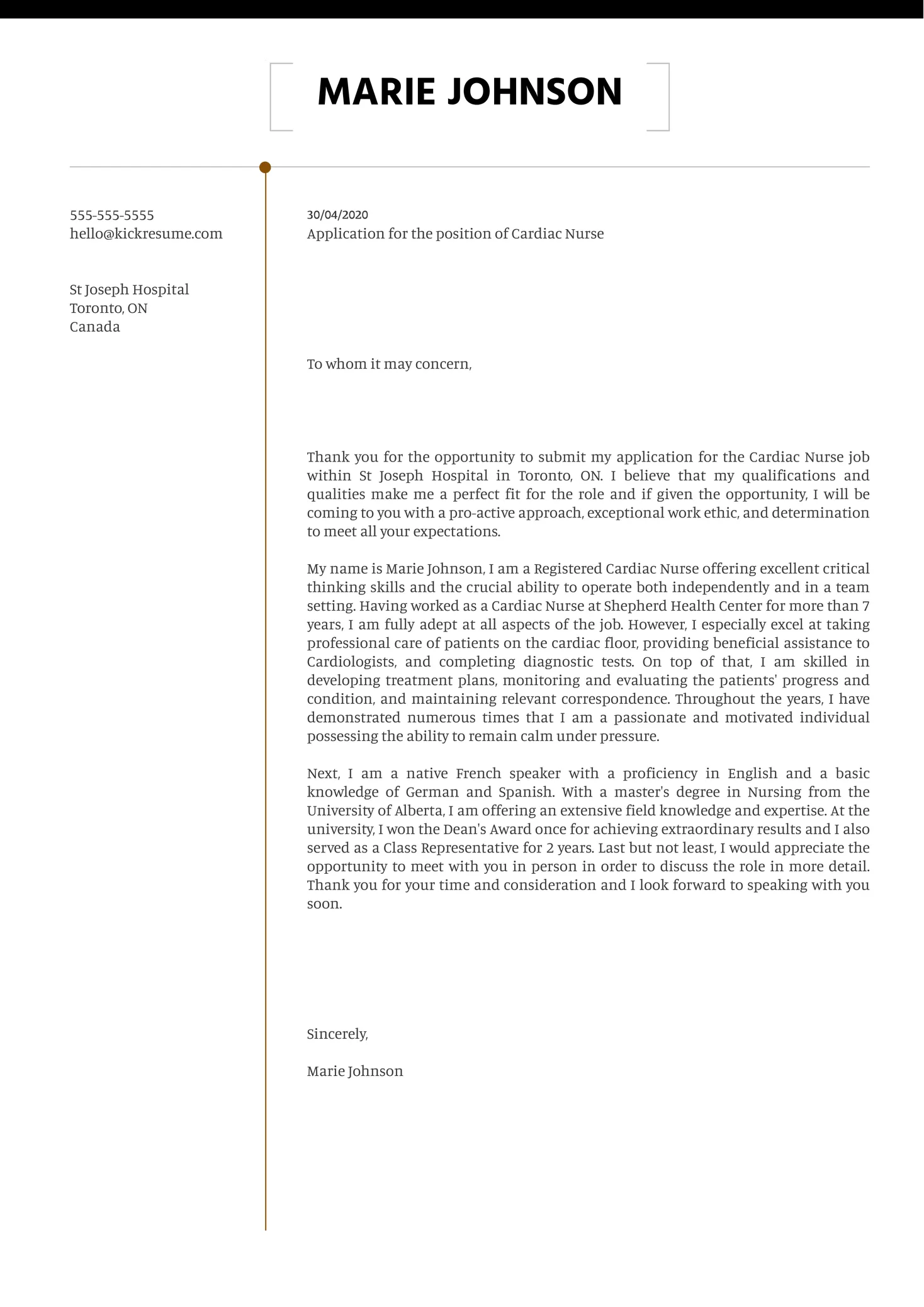
Whenever possible, quantify your achievements with numbers and statistics. This makes your accomplishments more impactful and provides tangible evidence of your capabilities. For example, instead of saying ‘Improved patient care,’ say ‘Improved patient satisfaction scores by 15% through implementing a new patient education program.’ Quantifiable results showcase your ability to deliver results.
Demonstrating Your Passion for Nursing
Nursing is a profession that requires both skill and compassion. Use your cover letter to convey your passion for nursing. Talk about why you chose this career path and what motivates you. Explain your approach to patient care, your values, and your commitment to providing excellent care. Show your enthusiasm for helping others and making a difference in patients’ lives.
Expressing Your Interest in the Specific Role
Tailor your cover letter to the specific job and the organization. Explain why you’re interested in this particular role and what attracts you to the organization. Research the organization and mention any specific programs, values, or initiatives that resonate with you. Showing that you understand the role and have a genuine interest in the organization will make a positive impression.
Showcase Your Knowledge of the Organization
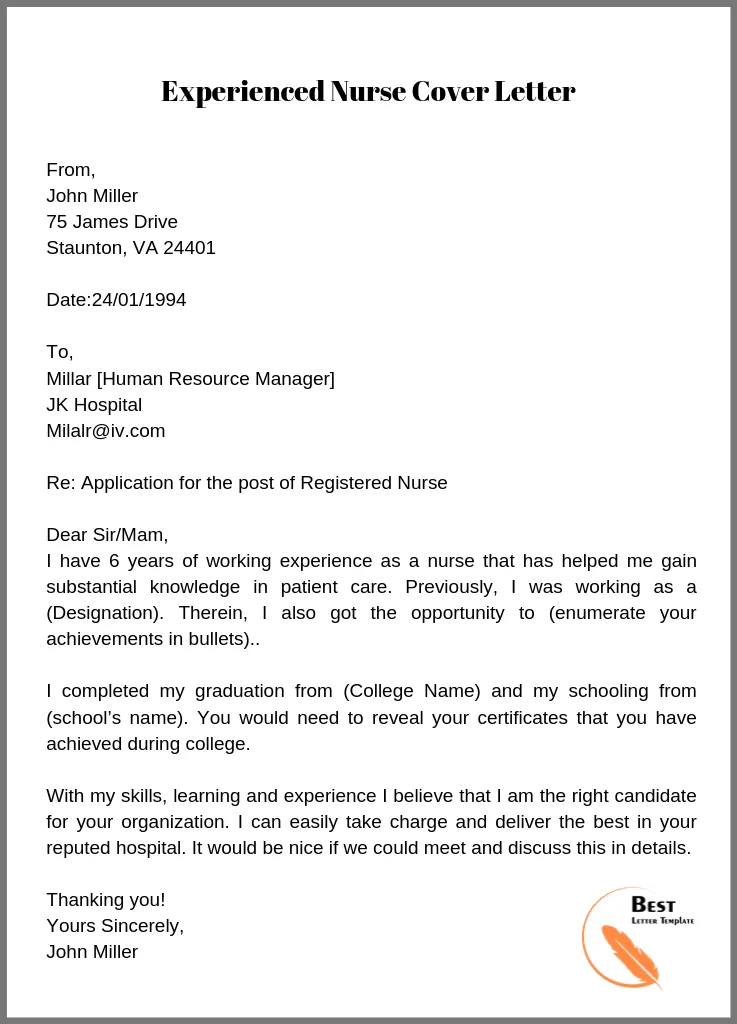
Demonstrate that you’ve researched the organization. Mention specific aspects of the organization that appeal to you, such as its mission, values, or any recent accomplishments. Highlight any connections you have to the organization, such as previous experience in a similar setting, or any knowledge of their specific patient care programs. This shows that you are truly interested in working there.
Formatting Your Nursing Cover Letter
The formatting of your nursing cover letter is as important as the content. Proper formatting ensures that your letter is easy to read and visually appealing. Clear formatting enhances readability and professionalism. Following these guidelines will improve your letter’s impact.
Choosing the Right Font and Font Size
Choose a professional and easy-to-read font, such as Times New Roman, Arial, or Calibri. Use a font size between 11 and 12 points. Ensure there is sufficient space between paragraphs and sections to make the letter visually appealing. Avoid using overly decorative fonts that can distract the reader.
Maintaining a Professional Tone
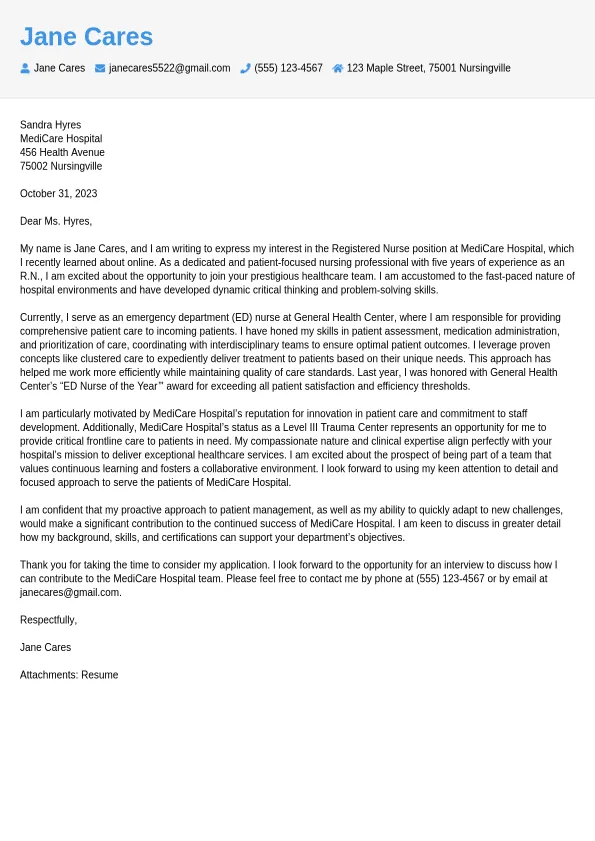
Maintain a professional tone throughout your cover letter. Use formal language and avoid slang or informal expressions. Be polite and respectful in your writing. Proofread carefully to avoid any errors that could undermine your professionalism. Your cover letter should reflect your professional demeanor.
Proofreading and Editing
Proofread your cover letter multiple times to catch any errors. Check for grammar, spelling, and punctuation mistakes. Ask a friend or colleague to review your letter for clarity and accuracy. A polished cover letter shows that you pay attention to detail, a crucial trait in nursing.
Nursing Cover Letter Examples
Here are example cover letters for different experience levels. These examples can provide a valuable template to help you create your own nursing cover letter. Adapt the examples to fit your specific skills, experience, and the requirements of the job you are applying for. Remember to personalize each letter for each application.
Example 1 New Graduate
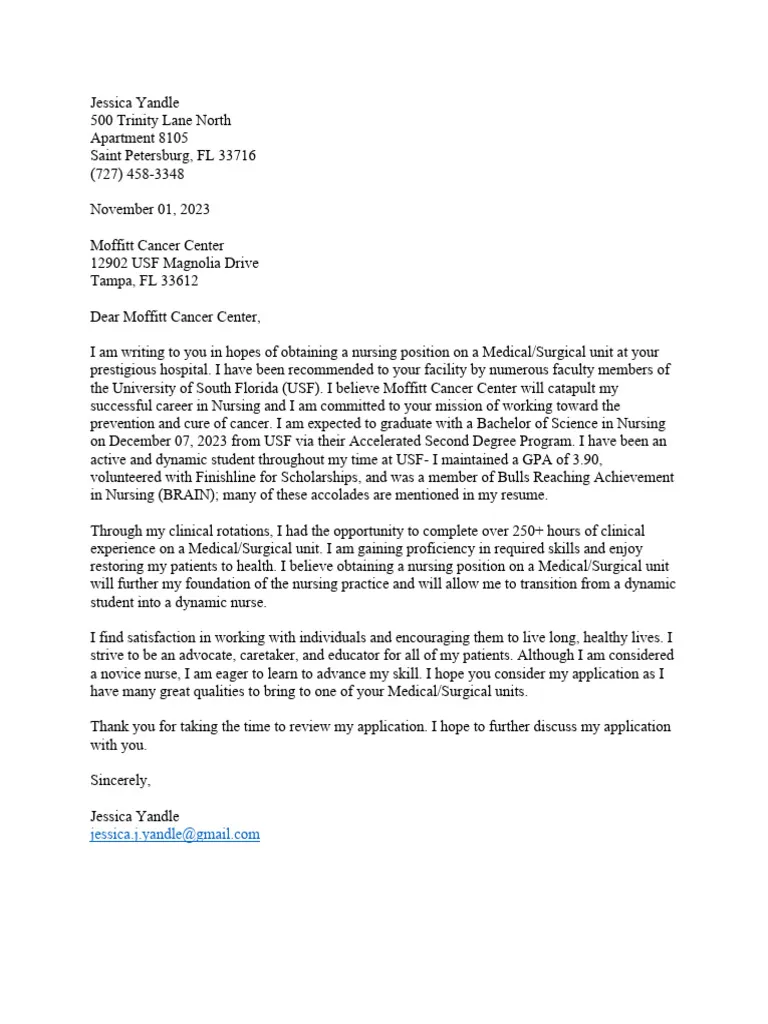
Dear [Hiring Manager Name],
I am writing to express my keen interest in the Registered Nurse position at [Hospital Name], as advertised on [Platform]. As a recent graduate from [Nursing School Name] with a Bachelor of Science in Nursing, I am eager to begin my nursing career at your esteemed institution. During my clinical rotations in various specialties, I developed a strong foundation in patient care, including skills in medication administration, wound care, and patient education. I am a highly motivated and compassionate individual with a strong commitment to providing high-quality care. I am excited about the opportunity to contribute to your team and further develop my skills as a nurse. I have attached my resume for your review and welcome the chance to discuss my qualifications further. Thank you for your time and consideration.
Sincerely, [Your Name]
Example 2 Experienced Nurse
Dear [Hiring Manager Name],
I am writing to apply for the Nurse Manager position at [Hospital Name], as advertised on [Platform]. With over 10 years of experience in nursing, including 5 years in a leadership role, I am confident in my ability to lead and manage a nursing team effectively. During my tenure at [Previous Hospital Name], I successfully implemented [Specific Initiative] that resulted in a 15% improvement in patient satisfaction scores. I am skilled in staff development, performance management, and process improvement. I am passionate about creating a supportive and efficient work environment. I am particularly drawn to [Hospital Name]’s commitment to [Specific Value or Program]. My resume provides further details about my qualifications and accomplishments. Thank you for your consideration.
Sincerely, [Your Name]
Example 3 Nurse Manager
Dear [Hiring Manager Name],
I am writing to express my interest in the Nurse Manager position at [Hospital Name]. I have been a registered nurse for 10 years and have experience managing multiple medical teams. I am skilled in resource allocation and conflict resolution. I am able to ensure that my team is in compliance with all standards. I have worked in many different hospital and clinic settings in the course of my career. I have been responsible for staffing, staff development, and quality control. I am interested in this position because of the opportunity to join your team and contribute my expertise to your organization. I have attached my resume for your review.
Sincerely, [Your Name]
Common Mistakes to Avoid
Avoiding common mistakes can significantly improve your cover letter. These pitfalls can undermine your application. Recognizing and correcting these errors can boost your chances of success.
Generic and Vague Language
Avoid using generic or vague language that could apply to any job. Instead, use specific examples and quantify your accomplishments. Generic statements don’t stand out and fail to impress hiring managers. Show instead of tell to create a stronger impression.
Typos and Grammatical Errors
Carelessly written cover letters damage your credibility. Always proofread carefully for typos, spelling errors, and grammatical mistakes. These errors can make you appear unprofessional and careless. Always ask someone else to review your cover letter before submitting it.
Focusing on Yourself Too Much
While it’s important to highlight your skills, don’t make your cover letter all about yourself. Instead, focus on how you can contribute to the organization and what you can do for them. Show how your skills and experiences meet the needs of the employer. Frame your letter as a discussion of your value.
Ignoring the Job Description
Always tailor your cover letter to the specific job requirements. Read the job description carefully and highlight the skills and experiences that match the employer’s needs. Failing to address the specific requirements will make it appear that you haven’t researched the role and are just sending a generic application.
Conclusion Crafting a Winning Cover Letter
Crafting a winning nursing cover letter requires careful attention to detail, a clear understanding of the job requirements, and a genuine expression of your interest and qualifications. By following the guidelines provided in this article, you can create a cover letter that effectively showcases your skills, experiences, and passion for nursing. Remember to personalize your letter for each application, and always proofread carefully. Good luck with your job search!
